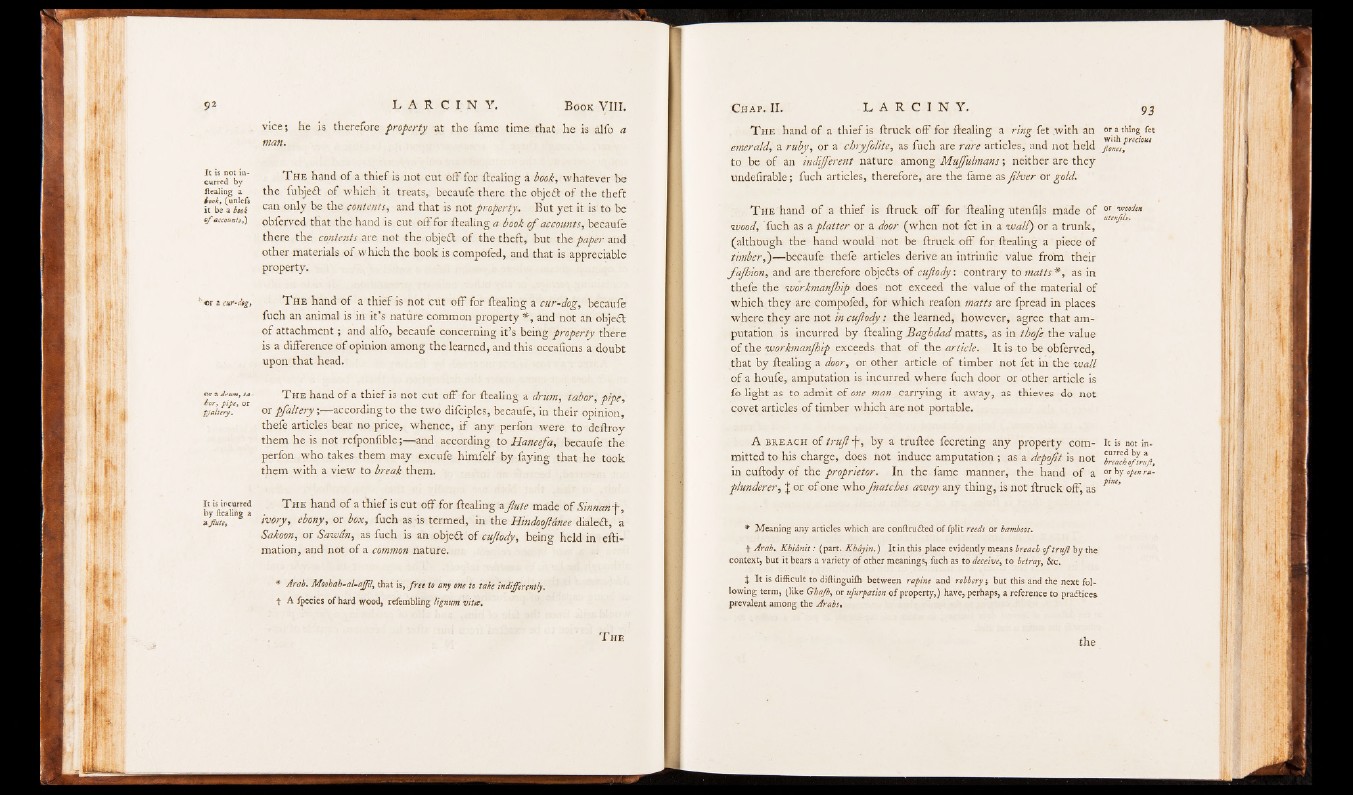
It is not incurred
by
ftealing a
took, (unlefs
it be a book
o f accounts,)
'v«r a cur-dogy
or a drum, tabor,
pipe, or
pjaltery.
It is incurred
by ftealihe a
a fiutty
vice; he is therefore property at the fame time that he is alfo a
matt.
T he hand of a thief is not cut off for ftealing a book, whatever be
the fubjedt of which it treats,, becaufe there the objedt of the theft
can only be the contents, and that is not property-. But yet it is to be
obferved that the hand is cut off for ftealing a book o f accounts, becaule
there the contents are not the objedt of the theft, but the paper and
other materials of which the book is compofed, and that is appreciable
property.
T he hand of a thief is not cut off for ftealing a cur-dog, becaule
fuch an animal is in it’s nature common property * , and not an objedt
of attachment; and alfo, becaufe concerning it’s being property there
is a difference of opinion among the learned, and this occalions a doubt
upon that head.
T he hand of a thief is not cut off for ftealing a drum, tabor, pipe,
or pfaltery;— according to the two difciples, becaufe, in their opinion,
thefe articles bear no price, whence, if any perfon were to deftroy
them he is not refponfible;— and according to Haneefa, becaufe the
perfon who takes them may excufe himfelf by faying that he took
them with a view to break them.
T he hand of a thief is cut off for ftealing a flute made of Sinnanf,
ivory, ebony, or box, fuch as is termed, in the Hindoofldnee dialed, a
Sakoon, or Sawan, as fuch is an objedt of cuflody, bein°- held in efti-
mation, and not of a common nature.
* Arab. Moobah-al-ajfil, that is, fr e e to any one to tabe indifferently.
t A fpecies o f hard wood, refembling lignum •vita,
T HE
T he hand of a thief is ftruck off for ftealing a ring fet with an
emerald, a ruby, or a chryfolite, as fuch are rare articles, and not held
to be of an indifferent nature among Muffulmans; neither are they
undefirable; fuch articles, therefore, are the fame as filver or gold.
T he hand of a thief is ftruck off for'ftealing utenlils made of
wood, fuch as splatter or a door (when not fet in a wall) or a trunk,
(although the hand would not be ftruck off for ftealing a piece of
timber,)— becaufe thefe articles derive an intrinfic value from their
fajhion, and are therefore objedts of cuflody: contrary to matts * , as in
thefe the workmanjhip does not exceed the value of the material of
which they are compofed, for which reafon matts are Ipread in places
where they are not in cuflody: the learned, however, agree that amputation
is incurred by ftealing Baghdad matts, as in thofe the value
of the workmanjhip exceeds that of the article. It is to be obferved,
that by ftealing a door, or other article of timber not fet in the wall
of a houfe, amputation is incurred where fuch door or other article is
lo light as to admit of one man carrying it away, as thieves do not
covet articles of timber which are not portable.
A b r e a c h of truft •(, by a truftee fecreting any property committed
to his charge, does not induce amputation ; as a depoflt is not
in cuftody of the proprietor. In the fame manner, the hand of a
plunderer, J or of one who fnatches away any thing, is not ftruck off, as
* Meaning any articles which are conftru&ed o f Iplit reeds or bamboos.
f Arab. Khianit: (part. Khayin. ) It in this place evidently means breach o f truji by the
context, but it bears a variety o f other meanings, fuch as to deceive, to betray, See.
t I t is difficult to diflinguilh between rapine and robbery; but this and the next following
term, (.like Ghajb, or ufurpation o f property,) have, perhaps, a reference to practices
prevalent among the Arabs.
or a thing fet
with precious
fortes,
or nuoodett
utenfils.
It is not incurred
by a
breach o f truji,
or by open rapine,
the